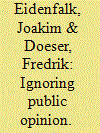| Srl | Item |
| 1 |
ID:
147965


|
|
|
|
|
| Summary/Abstract |
This article investigates why the governments of Australia and Poland decided to contribute military forces to the United States led invasion of Iraq in March 2003 when a majority of Australian and Polish citizens were opposed to national involvement in the invasion. The objective of the article is to increase understanding of the conditions under which governments ignore the public in their foreign policymaking. The article examines the explanatory power of four intervening variables: issue salience, elite debate, timing of the next election and the importance assigned to international gains by the government. On the basis of the Direct Method of Agreement, the article concludes that government perceptions of international gains and the timing of the next election were potentially necessary factors for the outcomes of the cases, while issue salience and elite debate were not necessary conditions. A distant election may, thus, provide sufficient electoral protection for a government that conducts a foreign policy to which the public is opposed.
|
|
|
|
|
|
|
|
|
|
|
|
|
|
|
|
| 2 |
ID:
166601


|
|
|
|
|
| Summary/Abstract |
This article investigates how strategic culture influenced the decision-making of Australia and Poland regarding the global coalition against the Islamic State. In the coalition, Australia has followed its tradition of active participation in United States-led operations, while Poland has embarked on a more cautious line, thereby breaking with its previous policy of active participation. The article examines how Australian and Polish responses to the coalition were shaped by five cultural elements: dominant threat perception, core task of the armed forces, strategic partners, experiences of participating in coalitions of the willing, and approach to the international legality of expeditionary operations. It finds that Australia and Poland differed on all five elements but that the major differences are found in dominant threat perception and core task of the armed forces.
|
|
|
|
|
|
|
|
|
|
|
|
|
|
|
|